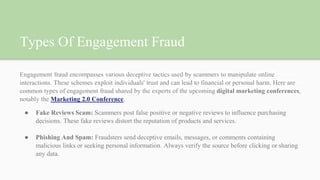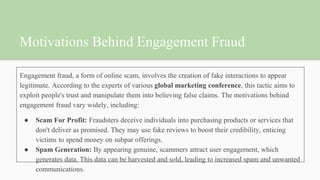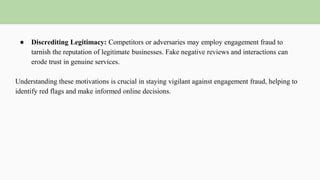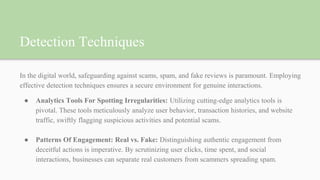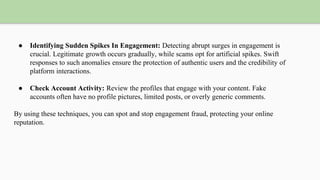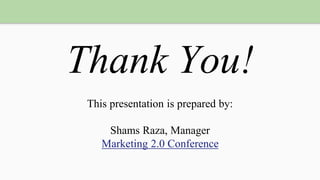Social Media Engagement Fraud Marketing 2.0 Unmasking Fake Likes And Followers.pptx
- 1. Social Media Engagement Fraud: Marketing 2.0 Unmasking Fake Likes And Followers
- 2. In the world of social media, a disconcerting issue has emerged—social media engagement fraud. This deceptive practice involves the creation of counterfeit likes and followers, undermining the authenticity of online interactions. In this presentation we will delve into the intricacies of unmasking these fake engagements, revealing the alarming prevalence of scams and spam. As per the advice of the digital marketing conferences, notably the Marketing 2.0 Conference, we will decipher the vital signs of legitimacy, empowering you to distinguish between genuine and deceitful online presence. With a focus on deciphering online reviews, this exploration aims to equip you with the knowledge needed to navigate the digital landscape securely.
- 3. What Is Social Media Engagement Fraud? Social Media Engagement Fraud involves deceptive tactics to inflate engagement metrics, such as likes, shares, and comments, on social media platforms. Scammers use automated bots or fake accounts to create an illusion of popularity, tricking users into thinking content is legit. This undermines the credibility of online interactions and skews analytics. Identifying fraud requires scrutinizing suspicious spikes in engagement, checking for spammy comments, and analyzing the authenticity of accounts engaging. To maintain a trustworthy online environment, users must report or block suspicious activity. According to the global marketing conferences, genuine engagement ensure meaningful connections, while scams erode trust and authenticity, impacting reviews and overall user experience.
- 4. Types Of Engagement Fraud Engagement fraud encompasses various deceptive tactics used by scammers to manipulate online interactions. These schemes exploit individuals' trust and can lead to financial or personal harm. Here are common types of engagement fraud shared by the experts of the upcoming digital marketing conferences, notably the Marketing 2.0 Conference. ● Fake Reviews Scam: Scammers post false positive or negative reviews to influence purchasing decisions. These fake reviews distort the reputation of products and services. ● Phishing And Spam: Fraudsters send deceptive emails, messages, or comments containing malicious links or seeking personal information. Always verify the source before clicking or sharing any data.
- 5. ● Impersonation: Scammers pose as legitimate businesses or individuals to gain trust. They solicit money or information through fake accounts or profiles. ● Social Media Contests: Fraudulent contests prompt users to engage with content for a prize. These often extract personal details or spread malware. Vigilance against suspicious online activities and reviews is crucial to avoid falling victim to engagement fraud.
- 6. Motivations Behind Engagement Fraud Engagement fraud, a form of online scam, involves the creation of fake interactions to appear legitimate. According to the experts of various global marketing conference, this tactic aims to exploit people's trust and manipulate them into believing false claims. The motivations behind engagement fraud vary widely, including: ● Scam For Profit: Fraudsters deceive individuals into purchasing products or services that don't deliver as promised. They may use fake reviews to boost their credibility, enticing victims to spend money on subpar offerings. ● Spam Generation: By appearing genuine, scammers attract user engagement, which generates data. This data can be harvested and sold, leading to increased spam and unwanted communications.
- 7. ● Discrediting Legitimacy: Competitors or adversaries may employ engagement fraud to tarnish the reputation of legitimate businesses. Fake negative reviews and interactions can erode trust in genuine services. Understanding these motivations is crucial in staying vigilant against engagement fraud, helping to identify red flags and make informed online decisions.
- 8. Impact On Individuals And Businesses Engagement fraud, often executed through scams and spam, poses a substantial threat to both individuals and businesses, tarnishing their online experiences and reputations. This illegitimate activity deceives victims by promising unreal engagement, such as likes, followers, or reviews, while delivering nothing of value. ● Erosion Of Trust: Such scams erode trust in online interactions. Individuals may question the authenticity of their online connections, while businesses might doubt the credibility of positive reviews.
- 9. ● Financial Losses: Both parties face financial losses. Individuals may pay for fake engagement, getting no real return. Businesses investing in engagement fraud lose money and miss out on real customer connections. ● Reputational Damage: Engagement fraud damages reputations. Individuals might be associated with fake accounts, while businesses could be labeled as untrustworthy due to inflated metrics. To combat this, individuals and businesses must remain vigilant, seeking legitimate engagement channels and relying on authentic reviews to make informed decisions.
- 10. Detection Techniques In the digital world, safeguarding against scams, spam, and fake reviews is paramount. Employing effective detection techniques ensures a secure environment for genuine interactions. ● Analytics Tools For Spotting Irregularities: Utilizing cutting-edge analytics tools is pivotal. These tools meticulously analyze user behavior, transaction histories, and website traffic, swiftly flagging suspicious activities and potential scams. ● Patterns Of Engagement: Real vs. Fake: Distinguishing authentic engagement from deceitful actions is imperative. By scrutinizing user clicks, time spent, and social interactions, businesses can separate real customers from scammers spreading spam.
- 11. ● Identifying Sudden Spikes In Engagement: Detecting abrupt surges in engagement is crucial. Legitimate growth occurs gradually, while scams opt for artificial spikes. Swift responses to such anomalies ensure the protection of authentic users and the credibility of platform interactions. ● Check Account Activity: Review the profiles that engage with your content. Fake accounts often have no profile pictures, limited posts, or overly generic comments. By using these techniques, you can spot and stop engagement fraud, protecting your online reputation.
- 12. Conclusion In conclusion, the unmasking of fake likes and followers has emerged as a critical subject in the world of social media engagement. The upcoming Marketing 2.0 Conference, vividly exposed the pervasive nature of fraud, where scammers employ spam tactics to deceitfully boost metrics. It is incumbent upon businesses to prioritize authentic growth over such illusory shortcuts, nurturing genuine connections with their audience. The imperative lies in distinguishing between legit and fabricated online presence, as credibility hinges on real engagement. Reviews shared during the conference emphasized the tangible benefits of combating this menace. Looking ahead, upcoming editions of the event will further delve into innovative strategies and technologies to ensure a fraud-resistant digital landscape.
- 13. Thank You! This presentation is prepared by: Shams Raza, Manager Marketing 2.0 Conference
Editor's Notes
- In this presentation, you will learn the the tactics behind fake social media engagement, uncovering the detrimental impacts on authenticity and brand credibility. You’ll also learn how to identify and combat fraudulent likes and followers to promote genuine online connections as suggested by the Marketing 2.0 Conference experts.



